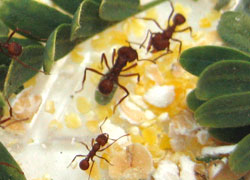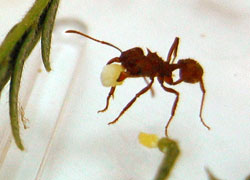Cool Ant Experiments
A great way to come up with science experiments on ants is to start out by watching what they do. Before you collect some from their nest to put in an ant farm, watch how they behave outside. Is there anything puzzling about their behavior that makes you really curious, and makes you want to ask a question, or maybe a hundred questions? Aha! A question is a great way to get started with a science experiment!
We have been watching ants for a long time, and have come up with a few questions of our own, too. We have also come up with some (but not all!) possible answers to our questions and some experiments that you can do to find out if our possible answers seem right. But we don’t know how the experiment will turn out, so it’s up to you to make a prediction about the experiment and then go and find out what happens.
1. How Do Ants “Talk” to Each Other?

If you watch ants for a while, you will notice that they interact with each other a lot. But how are they “talking” to each other? Just as humans have different senses like sight, hearing, touch, and smell, ants could have several different senses, too, which they use to communicate.
Here are some ways you could check to see which senses ants use the most. Try each one out, and make observations about how the ants react.
Sight: Wave something small, like the end of a pencil, close to the ants.
Hearing: Clap your hands.
Touch: Tap the ground close to the ants.
Smell: Blow very gently on the ants.
2. What Do Ants Like to Eat?

Have you ever discovered ants in your kitchen and wondered what they are doing there? Maybe they’re hungry and looking for something to eat! But what kinds of foods do ants like to eat? We came up with the idea that ants like to eat sweet things because they contain sugar, which is a form of energy.
Here are three kinds of sweet things the ants might like to eat: Skittles candies, Life Savers, and honey. If you give all three things to some ants, which one would you predict that the most ants will visit? What else might ants like to eat?
3. How Do Ants Build Their Nest?
If you have ants in an ant farm, you will have a chance to see something really neat: ants at work, digging a nest! But just like there could be a lot of different ways to draw a picture, there could also be a lot of different ways to dig an ant nest!
For example, what shape will it be? Will it be one giant hole, or a lot of small tunnels? Will the ants dig straight down, or will they dig sideways first? Will all of the ants dig at the same time, or will they take turns?
A neat way to answer some of these questions is by using time-lapse photography. What this means is to take a series of photographs of something over time. When you look at all of the photographs together, one after another, you will be able to see how the nest changes over time. You could almost think of a movie as a type of time-lapse photography, where the time between each picture is incredibly short!
For the best time-lapse photography, find a place where you can arrange the nest and the camera in the exact same place to take one picture every day. If you take one picture every day for one week, you should be able to start to see how the ants have been digging their nest!
Read more about: Ant Farm
Bibliographic details:
- Article: Ant Experiments
- Author(s): Dr. Biology
- Publisher: Arizona State University School of Life Sciences Ask A Biologist
- Site name: ASU - Ask A Biologist
- Date published:
- Date accessed:
- Link: https://askabiologist.asu.edu/ant-experiments
APA Style
Dr. Biology. (). Ant Experiments. ASU - Ask A Biologist. Retrieved from https://askabiologist.asu.edu/ant-experiments
Chicago Manual of Style
Dr. Biology. "Ant Experiments". ASU - Ask A Biologist. . https://askabiologist.asu.edu/ant-experiments
Dr. Biology. "Ant Experiments". ASU - Ask A Biologist. . ASU - Ask A Biologist, Web. https://askabiologist.asu.edu/ant-experiments
MLA 2017 Style
Be Part of
Ask A Biologist
By volunteering, or simply sending us feedback on the site. Scientists, teachers, writers, illustrators, and translators are all important to the program. If you are interested in helping with the website we have a Volunteers page to get the process started.


